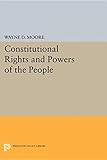Constitutional Rights and Powers of the People / Wayne D. Moore.
Material type: TextSeries: Princeton Legacy Library ; 5207Publisher: Princeton, NJ : Princeton University Press, [2017]Copyright date: ©1996Description: 1 online resource (310 p.) : 5 line illusContent type:
TextSeries: Princeton Legacy Library ; 5207Publisher: Princeton, NJ : Princeton University Press, [2017]Copyright date: ©1996Description: 1 online resource (310 p.) : 5 line illusContent type: - 9781400887453
- 323/.0973 23
- KF4552 .M66 2017eb
- online - DeGruyter
| Item type | Current library | Call number | URL | Status | Notes | Barcode | |
|---|---|---|---|---|---|---|---|
 eBook
eBook
|
Biblioteca "Angelicum" Pont. Univ. S.Tommaso d'Aquino Nuvola online | online - DeGruyter (Browse shelf(Opens below)) | Online access | Not for loan (Accesso limitato) | Accesso per gli utenti autorizzati / Access for authorized users | (dgr)9781400887453 |
Frontmatter -- Contents -- List of Figures -- Preface -- Introduction. Reconceiving Constitutional Politics -- Chapter 1. Toward Constitutional Citizenship: Official Pronouncements -- Chapter 2. Toward Constitutional Citizenship: Unofficial Commitments -- Chapter 3. Acting through Government and Independently -- Chapter 4. Enumerations and Implications -- Chapter 5. Problems of Practical Politics -- Chapter 6. Reconceiving Supreme Powers -- Chapter 7. Exercising Powers and Securing Rights -- Chapter 8. Interpretive Autonomy Revisited -- Conclusion. We the People: Reflections -- Postscript -- Index
restricted access online access with authorization star
http://purl.org/coar/access_right/c_16ec
American constitutionalism rests on premises of popular sovereignty, but serious questions remain about how the "people" and their rights and powers fit into the constitutional design. In a book that will radically reorient thinking about the Constitution and its place in the polity, Wayne Moore moves away from an exclusive focus on courts and judges and considers the following queries: Who is included among the people? How are the people politically configured? How may the people act? And how do the people relate to government and other representative structures? Going beyond though not excluding relevant discussions of specific constitutional texts (such as the preamble, articles V and VII, and the ninth, tenth, and fourteenth amendments), Moore examines historical material from the antebellum period, such as the opinions of U.S. Supreme Court justices in the notorious Dred Scott case and significantly different perspectives from the writings and speeches of Frederick Douglass. He also looks at influential thinking from the founding period and examines precedents set during prominent controversies involving the establishment of a national bank, regulations of the economy, and efforts to limit sexual and reproductive choices. The penultimate chapter explores issues raised by claims of state interpretive autonomy, and the conclusion models various dimensions of the constitutional order as a whole. The book offers fresh insights into central problems of constitutional history, theory, and law.Originally published in 1996.The Princeton Legacy Library uses the latest print-on-demand technology to again make available previously out-of-print books from the distinguished backlist of Princeton University Press. These editions preserve the original texts of these important books while presenting them in durable paperback and hardcover editions. The goal of the Princeton Legacy Library is to vastly increase access to the rich scholarly heritage found in the thousands of books published by Princeton University Press since its founding in 1905.
Mode of access: Internet via World Wide Web.
In English.
Description based on online resource; title from PDF title page (publisher's Web site, viewed 30. Aug 2021)


